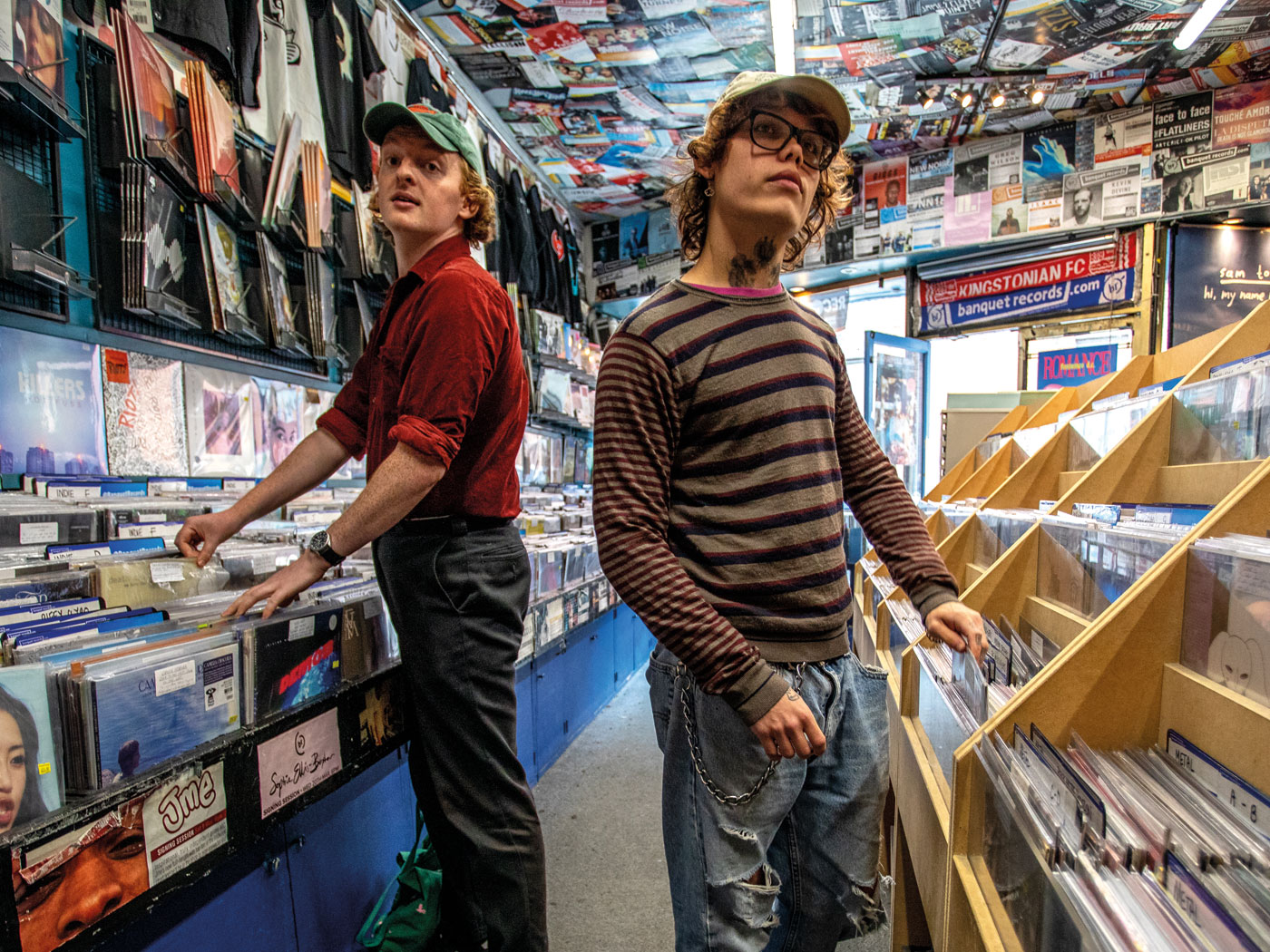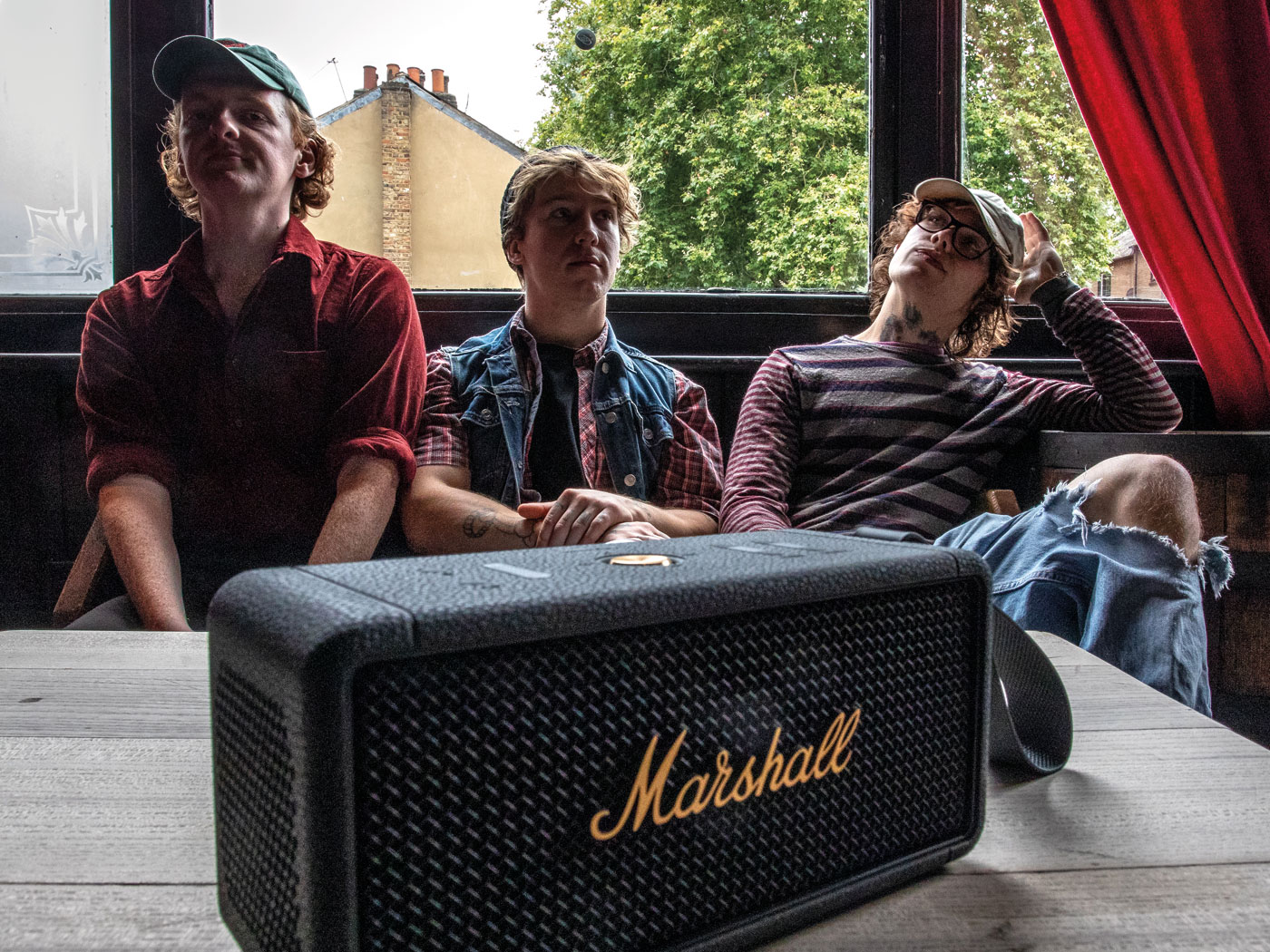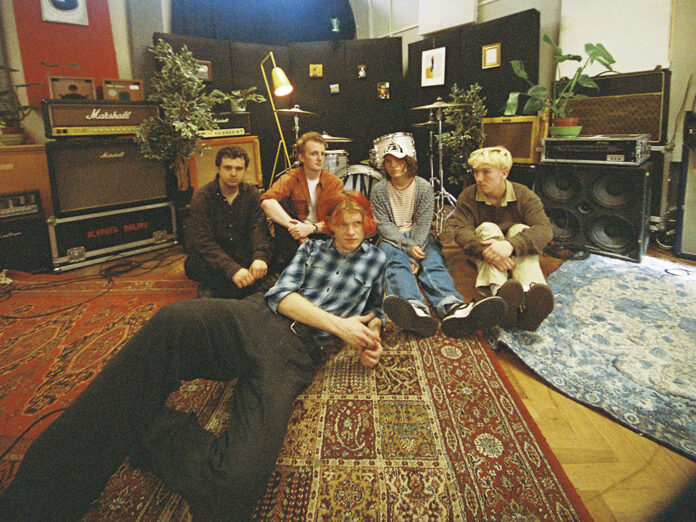“We’re really more of a cult than a band,” grins drummer Caius Stockley-Young from underneath an unseasonal woolly hat as he tries to explain the chemistry that defines King Nun. The five-piece formed when they were at school in south-west London and meet Uncut in nearby Kingston, scene of some of their earliest successes. It turns out that King Nun are a fairly self-contained unit. Caius produced their 2023 album LAMB at the Marshall Studio, brother Ethan (bass, percussion) painted the cover art, guitarist James Upton drives the tour van with Caius, while bassist Nathan Gane – “the human calendar” – is tour manager. That leaves singer Theo Polyzoides free to write lyrics, which are plucked from a pile of notebooks that he fills with ideas while the band are writing songs.
Subscription Required!
Subscribe now and save money on the shop price. Choosing our print and online option means not only will you get the magazine delivered direct to your door each week but you will also get exclusive subscriber access to this online content; which also includes access to a digital version of the magazine.

Login
Don't have an subscription?
“We’re really more of a cult than a band,” grins drummer Caius Stockley-Young from underneath an unseasonal woolly hat as he tries to explain the chemistry that defines King Nun. The five-piece formed when they were at school in south-west London and meet Uncut in nearby Kingston, scene of some of their earliest successes. It turns out that King Nun are a fairly self-contained unit. Caius produced their 2023 album LAMB at the Marshall Studio, brother Ethan (bass, percussion) painted the cover art, guitarist James Upton drives the tour van with Caius, while bassist Nathan Gane – “the human calendar” – is tour manager. That leaves singer Theo Polyzoides free to write lyrics, which are plucked from a pile of notebooks that he fills with ideas while the band are writing songs.
It’s an admirably DIY approach, as you’d expect from a band that first bonded over a love of CGBG bands, particularly Marquee Moon, which became an early point of unity when they formed as teenagers in 2013. Their tastes have changed and diversified as they have got older, but LAMB still resounds with the punkish energy that saw them named Best Rock Newcomers at Bonnarroo festival. There’s galloping opening number “Golden Age”, the grungy crunch of “Escapism” and “OCD”, which fizzles with New Wave tension. It’s powerful, visceral music. “We wanted to set fire to stuff and this was the next best thing,” says Ethan. “Maybe it’s that teenage boy thing, a need to be a bit destructive to see what happens when you set fire to the deodorant can. With music you can do that in a constructive way.”
Ethan, Caius and James Upton have gathered in Kingston to induct Uncut into the cult of King Nun and point out some of the key venues and locations that helped nurture the band through those important early days. They released their debut single, “Tulip”, in 2016 – a hyperactive piece of power-punk that lasts just over two minutes. By the time they came to record cathartic second album LAMB, the quintet had more experience under their belt having released Mass in 2019 and played shows with bands like Foo Fighters.
They also had the support of a label that was happy to let Caius produce their second album at the Marshall Studio in Buckinghamshire. He records most of their demos, so seemed an obvious pick when they were searching for producers. “We have worked with great producers previously but keeping it within the five of us made it a lot easier,” he says. “It’s much easier to discuss things with each other then with somebody you have just met and I knew what the songs needed to sound like.”
“That’s what we appreciate about Marshall,” chips in James. “They give us the freedom and the resources to do what we want to do and then support us when we do it.” That’s reassuring for a band, as is having Marshall equipment to work with. “A Marshall amp is built for rock – they are very loud and they are very reliable,” says Ethan. Caius agrees. “They make great gear and you can’t name a guitar player who doesn’t use a Marshall amp,” he says. “It’s great to have that quality behind you on the stage. It means something to everybody who knows music. With equipment, you want things to sound great, to work properly and not get in the way of creating. That’s what we get from Marshall.”
King Nun’s method of creating is, they explain, democratic and collaborative. Any band member can bring in an idea, which will then evolve in rehearsal as each musician introduces their own musical influences. James feels their best songs are the ones that capture everybody’s input. “Because we do have quite different tastes and that all comes out in the friction,” he says.
King Nun wrote around 100 songs before honing them down to the 11 that appeared on LAMB. The group are now deep in the writing process for LAMB’s successor, which they promise will be a different sort of animal. “We don’t want to do the same thing,” says Caius. “We did a fairly straight-up rock album with LAMB so now we are going to take some risks. But at the moment we don’t know what those risks are going to be, and we don’t want to force it.” James nods in agreement. “As soon as you put a label on it,” he muses. “That’s when it stops becoming true.”
Kingston, London
King Nun take you on a whistle-stop tour of their favourite local haunts

When choosing where to meet in Kingston, King Nun immediately suggest Banquet Records. The record shop is a focal point for Kingston’s strong music scene. Found on Eden Street, Banquet Records was originally part of Beggers Banquets, but in 2002 was taken over by employee Jon Tolley. It’s been named independent retailer of the year four times since 2011 and is central to King Nun’s early days as a place for the band members to buy – and sell – records but also as a gig promoter. Banquet Records regularly put on shows in local venues, and these gave King Nun some of their first live experience.
“Jon was such a big supporter and anytime there was a band playing at one of the venues, he’d invite us down to play with them,” says James. “There usually wasn’t supposed to be an opening act but he would let us play and many of our early gigs were at a place called the Hippodrome, that no longer exists. We supported bands like Wolf Alice, Slaves, Palma Violets.”
Banquet Records was the first record shop to stock copies of King Nun’s early releases – something that was particularly special to band members who had saved their paper round money to buy records and fanzines from the shop on a Saturday afternoon. “Having a place like Banquet is so important for young bands,” says Caius. “They don’t discriminate, they sell Ed Sheeran as well as bands like us, so you get fans of rock and pop in one place. They do shows, they encourage and support young bands and that creates a community. It’s all well and good having social media and streaming but that isn’t the same as being in the same room as people who share your interests.”
Although King Nun meet Uncut in Kingston, they actually come from nearby Richmond and Twickenham. This is a corner of London that was once described as the Thames Delta because of the number of bands that hailed from the area or, in the case of the Rolling Stones, played early shows at places like the Crawdaddy Club, Richmond Athletic Ground and Eel Pie Island. Growing up, King Nun knew of this legacy and appreciated having so much musical history on their doorstep – but despaired at the lack of venues for current bands. The best they could find was a pub called The George in Twickenham, where a young King Nun would play five-minute grunge metal sets at the blues open mic night. “We were wildly out of place,” says James. “But some of the regulars saw we were kids and gave us support.”
Richmond does at least boast Richmond Park, one of London’s largest open spaces and a popular spot for King Nun when they needed some fresh air and a place to jam. “We’d trek out there with our acoustic guitars and sit around coming up with stuff,” says Caius. “We’ll often take our little portable [Willen II Marshall Bluetooth] speaker, which is a banging piece of equipment. If we are on tour we’ll take the bigger [Middleton II] speaker us.”

Through Banquet Records, King Nun played shows at Kingston’s many nightspots such as McLusky’s on Thames Street, location of their first “proper” gig but no longer in existence. McLusky’s might be gone but other venues have taken its place – one of the advantages of being a student town thanks to Kingston University is the number of clubs. There are also local art schools, including Richmond College where bassist Nathan was in the same class as BRIT award-winning rapper Dave. Other local acts included Goat Girl, Mac Wetha and Lava LaRue. “We did one gig at The Fighting Cocks with Mac Wetha, Lava LaRue and Shame,” says James. “It was a whole bunch of artists that seemed to be on the brink of making it.”
The Fighting Cocks, a five-minute walk from Banquet Records on Old London Road, is one of King Nun’s favourite Kingston venues. This is a rock pub that is knee-deep in live music. It has all the rock pub classics – sticky floor, leopard print walls, musty smell, jukebox packed with air guitar classics and a constant roster of young, hungry bands on stage almost every night of the week. King Nun have played their numerous times and often pop in to see who else is performing. “I think my favourite thing about it is the pool table,” says Caius. “Because it is positioned in the most annoying place possible – blocking the toilets and the exit at the same time, so you are always bumping into people. That creates interaction.”
The next level up from The Fighting Cocks is PRYZM on Clarence Street. This is another Kingston nightclub that has been adopted by Banquet for showcases and has hosted some big artists including Fontaines DC, The Hives and Foo Fighters. “It’s a nightclub but Banquet turned it into a venue, and it has an amazing sound system and gets some really big names,” says Caius. “It’s much bigger than the Fucking Cocks, so you kind of go from one to the other as your audience grows.”
King Nun have since played at some of London’s biggest venues, and in 2023 even played at Wembley Arena. “You can’t see a thing but when you hear that many people cheering, it is a pretty crazy feeling,” says Ethan. That access to London makes Kingston a particularly great location for King Nun, and their heart remains in this corner of south-west London. “Because Kingston is that little bit out of the way, it’s still like an underground culture that is pushing through the cracks,” says James. “People still have to fight a little bit for their space, and that can make it seem a bit more sincere.”


